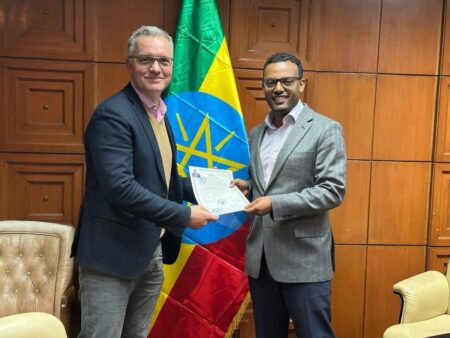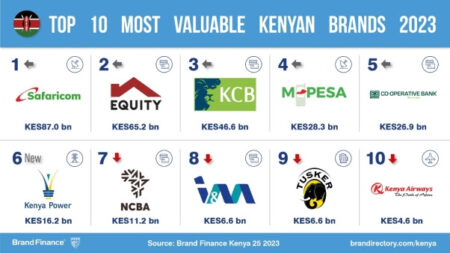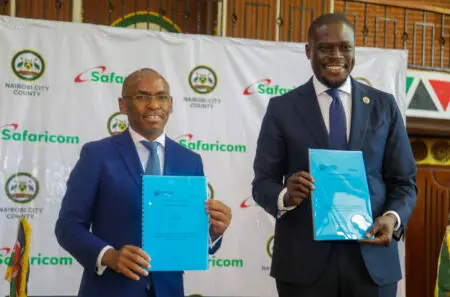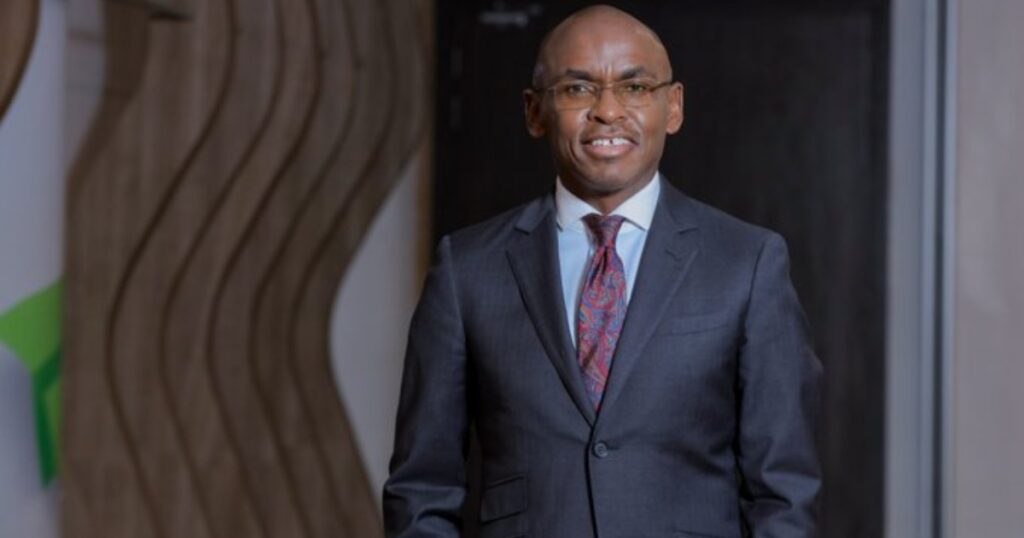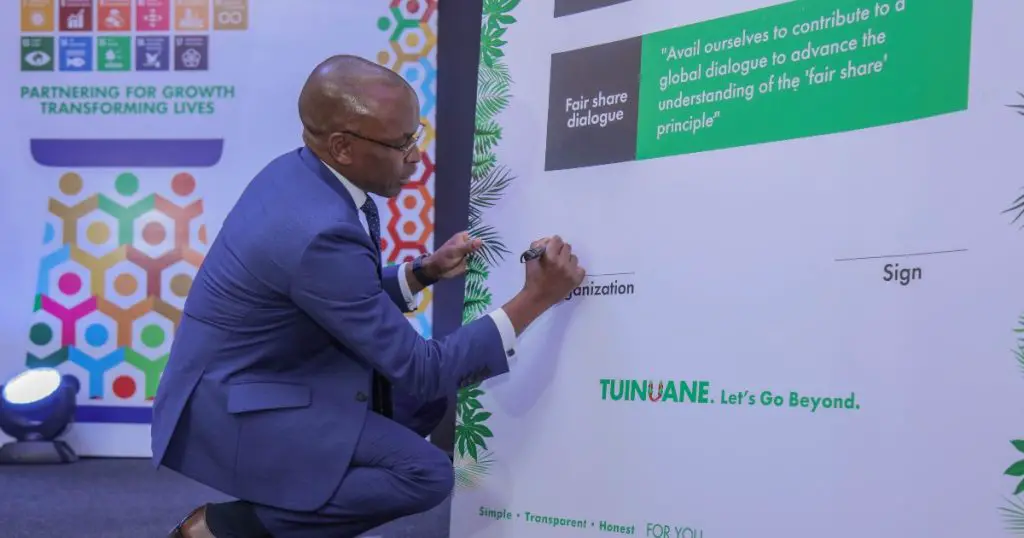- Abu Dhabi radiates optimism as over 300 startups join AIM Congress 2024
- TLcom Capital Raises $154 million in Funding to Boost Its African Growth
- Africa’s $824Bn debt, resource-backed opaque loans slowing growth — AfDB
- LB Investment brings $1.2 trillion portfolio display to AIM Congress spotlight
- AmCham Summit kicks off, setting course for robust future of US-East Africa trade ties
- Why the UN is raising the red flag on the UK-Rwanda asylum treaty
- Portugal’s Galp Energia projects 10 billion barrels in Namibia’s new oil find
- Wärtsilä Energy offers tips on how Africa can navigate energy transition and grid reliability
Browsing: Safaricom
- Safaricom targets a customer base of at least 10 million across 25 cities in the next year.
- Since Safaricom Ethiopia switched on its mobile telecommunications network, it has grown coverage from an initial 11 to 22 cities.
- Safaricom Ethiopia is building a wholly-owned mobile network and also has infrastructure sharing deal with state-owned Ethio Telecom.
Safaricom is now targeting a customer base of at least 10 million in Ethiopia in the next one year. The move is tailored to shake up the country’s telecommunication industry. Latest developments follows huge investments in the country, with cash transfer service M-PESA now on the table.
Since Safaricom Telecommunications Ethiopia switched on its mobile telecommunications network and services in Addis Ababa in October last year, major inroads have been made in the second-most populous country in Africa.
It has grown coverage from an initial 11 cities when it launched to 22. The telco with …
- Project Management Institute’s recent Talent Gap report shows 2.3 million people will be needed each year to fill all project management-oriented (PMO) positions that are expected to open by 2030.
- To remain competitive, companies will need to hire problem solvers and relationship builders who can help drive change and deliver strategic value.
- During this decade, sub-Saharan Africa will witness a 40 percent growth in PMO employment opportunities.
African economies could be headed to a severe shortage of skilled project managers to implement critical infrastructure investments across the continent.
According to Project Management Institute’s most recent Talent Gap report, 2.3 million people will be needed each year to fill all project management-oriented (PMO) positions expected to open by 2030.
To remain competitive, companies will need to hire problem solvers and relationship builders who can help drive change and deliver strategic value.
During this decade, sub-Saharan Africa will witness a 40 percent …
- Telco giant Safaricom is the most valuable Kenyan brand, estimated at $648 million. It also has the highest Sustainability Perceptions Value at $93 million.
- Equity Bank and Kenya Commercial Bank rank second and third most valuable brands and top-two strongest brands with impressive AAA+ ratings.
- Crown Paints Kenya is the fastest-growing Kenyan brand, up 70 percent
Safaricom’s value went up by 14 per cent to $648 million over the past year maintaining its position as Kenya’s most valued brand even as lenders Equity and KCB regional expansion drive also paid dividends as measured by consultancy Brand Finance.
Brand Finance East Africa Regional Director Walter Serem says Safaricom has shown considerable resilience during difficult operating conditions over the past year. In the period under review, East Africa’s most profitable telco registered significant revenue growth, while successfully completing the first two years of its five-year strategy.
This strategy is guided by the …
- Safaricom and Nairobi City County have signed a partnership to digitise the county’s services and operations.
- Under the partnership, Safaricom will develop and support the “My Nairobi App” as part of the “My Nairobi” hub that provides digital services and citizen engagement.
- The platform offers a one-stop shop for businesses in the County where residents, and visitors, can access services with multiple functionalities including making payments.
Safaricom and Nairobi City County have signed a partnership to digitise the county’s services and operations. Under the partnership, Safaricom will develop and support the “My Nairobi App” as part of the “My Nairobi” hub that provides digital services and citizen engagement.
“This My Nairobi Hub will enable us to offer better services to the people of Nairobi. It offers a one-stop shop for businesses in the County where residents, and visitors, can access services with multiple functionalities including making payments. Residents of Nairobi …
- Safaricom Ethiopia Service Revenue for the first month of operations was KSh 9.1 million, while Total Revenue, including handsets sales, was KSh 98.3 million
- Safaricom Kenya delivered a solid set of results despite the prevailing macroeconomic challenges leading to a tough operating environment in Kenya and elevated pressure on consumer spending
- In Kenya, voice service revenue dropped by 3.8% to KSh 39.88 Billion; Mobile Data revenue grew by 11.3% to KSh 26.30 Billion, while M-PESA revenue grew by 8.7% to KSh 56.86 Billion
Safaricom has registered its first revenue from its Ethiopia operations in its first reporting cycle since the launch of its commercial operations.
Safaricom Ethiopia Service Revenue for the period ended September 30th 2022, was KSh 9.1M, while Total Revenue, including handsets sales, was KSh 98.3 million.
Safaricom Kenya’s net income grew by 0.6% year on year, supported by a 4.6% growth in revenue.
Safaricom Kenya delivered a …
Why does this happen? Is it governance? Is it the CEO? Is it the CEO’s relationship with the Board of Directors? Or is it something else?
High CEO turnover may boil down to an individual problem, but before pointing too many fingers, organizations may want to turn inward and seek any possible problems occurring in the history of the role as well.
Now, let us look at Kenya’s top four CEO changes in 2022.…
- Peter Ndegwa has mobilised his Kenyan counterparts to join the Africa Business Leaders Coalition
- The Safaricom chief executive urged CEOs to take the initiative and be part of the commitment to advance Africa’s sustainable growth, prosperity and development
- The telco is one of the coalition’s founding members whose aim is to bring together CEOs from across the continent to help drive action on pressing sustainability issues
Kenyan CEOs have been urged to join the Africa Business Leaders Coalition (ABLC).
While mobilising his counterparts, Safaricom’s CEO, Peter Ndegwa, urged CEOs to take the initiative and be part of the commitment to advance Africa’s sustainable growth, prosperity and development.
Safaricom is one of the coalition’s founding members whose aim is to bring together CEOs from across the continent to help drive action on pressing sustainability issues and promote UN Global Compact principles in their supply chains and broader ecosystem.
Speaking during Safaricom’s …
- Safaricom has officially kicked off a large-scale customer pilot of its network in Ethiopia as part of ongoing plans to officially launch operations in Ethiopia
- The telco has launched the trial network in Dire Dawa, Ethiopia’s second largest city after its capital Addis Ababa
- The launch of the network is part of Safaricom’s phased city-by-city regional network roll-out and rigorous service tests building towards its national launch in October
Safaricom Ethiopia has officially kicked off a large-scale customer pilot of its network in Ethiopia as part of ongoing plans to officially launch operations in the Horn of Africa country.
The telco has launched the trial network in Dire Dawa, Ethiopia’s second largest city after its capital Addis Ababa.
The launch of the network is part of Safaricom’s phased city-by-city regional network roll-out and rigorous service tests building towards its national launch in October.
Safaricom Ethiopia said the customer pilot would …
The Kenyan stock market resumed Wednesday following the general election break with a $268 million gain, as early results revealed a close contest involving Deputy President William Ruto and former Prime Minister Raila Odinga.…
Generally speaking, the proliferation of mobile phone technology has increased access to mobile money services (MMS) and is the backbone of mobile money deployment in both rural and urban areas of Africa.
“Despite its enormous benefits, embracing the usage and acceptance of mobile money has mostly been low due to security issues and challenges associated with the system,” warns professor Guma Ali from the Nelson Mandela African Institution of Science and Technology.
In a paper titled ‘Evaluation of Key Security Issues Associated with Mobile Money Systems in Uganda,’ the pundit suggests the need to carry out a survey to evaluate the key security issues associated with mobile money systems in Uganda (and Africa).
In the study that followed, which employed a descriptive research design, and stratified random sampling technique to group the population, some 741 registered mobile money (MM) users and 447 registered MM agents along with 52 mobile network …





